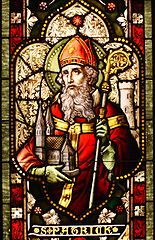
The Life And Writings Of Saint Patrick -Saint Patrick
II.—PATRICK AND TRIAN THE CRUEL
On the way, at some place which is not determined, he met with certain wrights who were felling a tree. They were slaves, and from the severity of their labour the palms of their hands were blistered, and the blood was oozing through the broken skin. “Who are you?” said Patrick. “We are slaves,” they said, “to Trian, son of Fiacc, son of Amalgaid, a brother of Trichem (of Down). We are in bondage and in great tribulation, and are not even allowed to sharpen our axes against a grindstone, lest the labour might be lightened for us; and so, as you see, the blood comes through our hands.”
This was a case not only of cruel usage of the poor slaves, but of cruelty that was needless and deliberate. Patrick at once gave them some relief by blessing the iron tools with a blessing ‘that sharpened them for their work, even better than a flagstone would have done.’ But he did more—he went at once to the king at Rath Trena to remonstrate with him. Unfortunately, we cannot exactly identify the place. Trian, Trichem, and Dichu were three brothers. Dichu, St. Patrick’s first friend in Ulidia, dwelt somewhere near Saul. Trichem dwelt at Down, so we may safely infer that Trian dwelt beside or near a lake, as the narrative shows, on the road to Down from the south, or south-west. It was probably either at Castlewellan or Dundrum, for there was a lake at both places, and, indeed, not one but several sheets of water were in that neighbourhood.
Patrick approaching begged the cruel chief to have pity on his slaves; ‘but Trian did nothing for him.’ Then ‘Patrick fasted against him,’ that is, kept urging his request at the door of the chieftain’s dun, taking neither food nor drink until his petition would be granted. Still the rude chief churlishly refused the request of the man of God. Thereupon Patrick turned away on the morrow from the fort, having fasted in vain; but, instead of casting the dust off his feet against it, as the Gospel directs, he cast his spittle on a rock by the wayside—no doubt in anger—and lo, the rock broke into three parts, and one part was flung away a thousand paces. “One-third of the fasting,” said Patrick, “be upon the rock, one-third on the king and on his fort, and one-third on the district.” To some extent he spared the guilty prince; but he added, “there will never be of him either King or Crown Prince. He himself shall perish soon, and he shall go down to the bitter hell.”
And so it came to pass—all the sooner because Trian, instead of repenting, committed a new crime against God and his Apostle. He himself in person went to bind and beat the poor wood-cutting slaves, who had told Patrick of their harsh treatment. This new crime sealed his doom. On the way his horses dashed wildly into the lake by the roadside, carrying with them the chariot with Trian and his charioteer along with him. ‘That was his last fall,’ says the Chronicle. He was heard of no more; but the lake has borne his name. It is still called Loch Trena; though the unhappy chief will never come out of the lake until the eve of the judgment day, ‘and he will not come to happiness even then.’ If Patrick worked miracles at all, or by divine authority denounced God’s vengeance on oppressors, there could hardly be any crime more worthy of just chastisement than this. It was a lesson greatly needed, and must have produced an excellent effect on savage masters like Trian.
But, although divine vengeance so promptly and so terribly overtook the wicked King Trian, his family, at least partially, escaped the doom. The king’s wife, seeing what had happened, went to Patrick and fell on her knees in penitential sorrow. Then Patrick, accepting her sincere penance, blessed her womb and her children—namely, Setne, son of Trian, and Jarlaide, his brother, also son of Trian. ‘Sechnall baptised Setne, Patrick baptised Jarlaide’; and Patrick said that he would afterwards be a successor of his. And so, indeed, he was. He succeeded Benignus as Coadjutor Bishop of Armagh after the death of the latter in 467; and, according to the ancient lists already referred to, continued in that office for fourteen years, so that he must have died about the year 481. So Patrick put four coadjutors, or assistant bishops, under the sod before himself; but the next, Cormac, was destined to outlive his master, only, however, for a very brief period.
The incidents here related beget some chronological difficulties. The narrative seems to imply that it was on this occasion that Sechnall baptised Setne, son of Trian. If so, either Sechnall must have lived after Patrick’s return from the South of Ireland, or the visit here mentioned must have taken place at an earlier date. Yet, no reference is made to any such visit of our Apostle to the County Down after his first departure from Dichu to go to Tara. As we have said, the date of Sechnall’s death, as given in the Chronicon Scotorum, is too early; it must be placed at least thirteen years subsequent to his appointment to the see of Dunshaughlin, which probably took place after his return from foreign parts. In that case he might have accompanied Patrick on this occasion from Dunshaughlin to Down; and it was probably during the journey, while they were wending their way north through the Pass of Moira, that the famous interview took place at which Sechnall presented his poem in praise of Patrick to the Saint, keeping back his name to the end.

 Keep Site Running
Keep Site Running